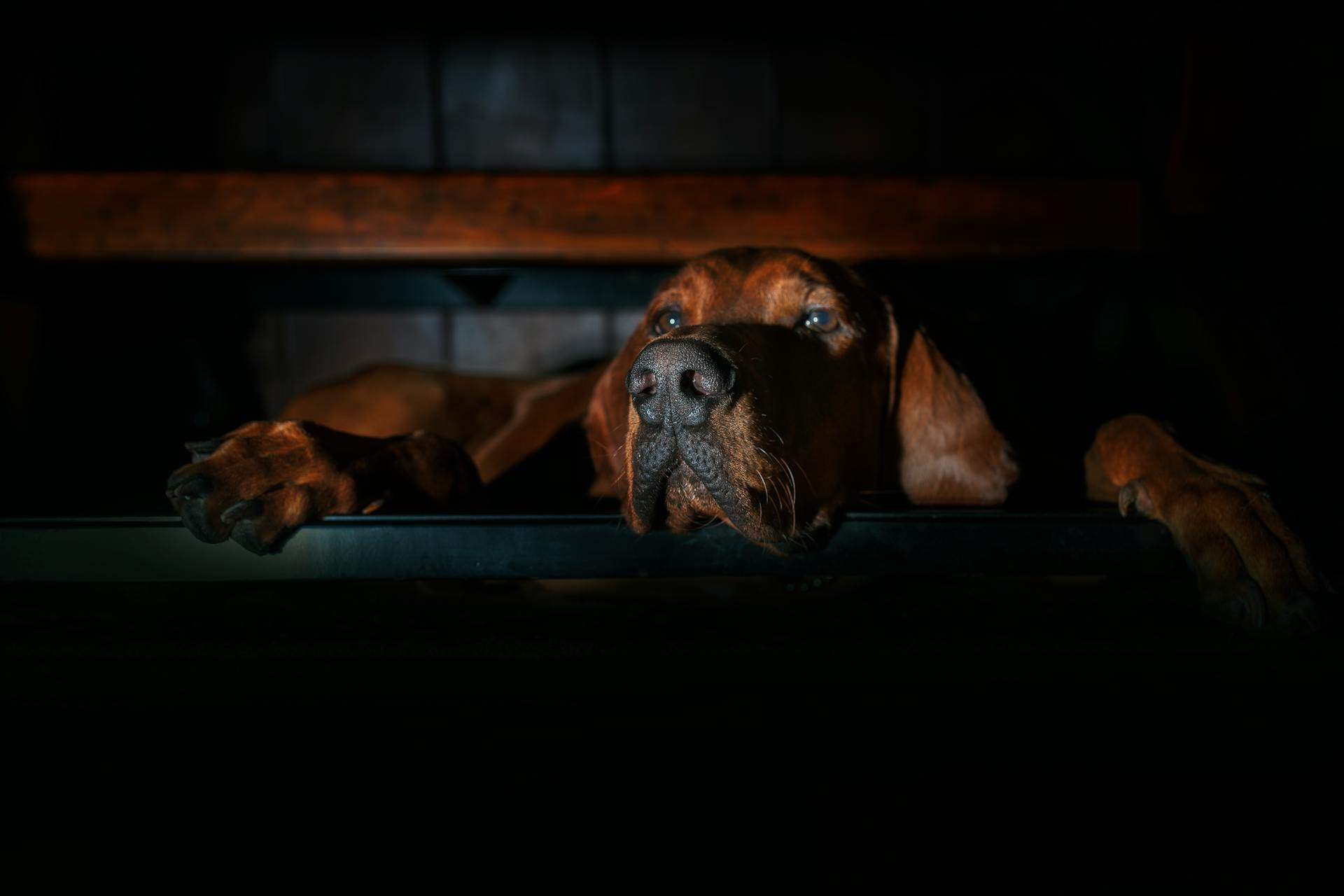
The Treeing Walker Coonhound is a breed that's steeped in history and tradition. This breed originated in the 18th century in the United States.
They were bred to hunt small game, particularly raccoons, and were known for their exceptional tracking ability. Their strong prey drive and keen sense of smell made them a valuable asset to hunters.
The Treeing Walker Coonhound is a medium-sized dog with a muscular build and a short, smooth coat that's easy to maintain. They typically weigh between 45-65 pounds and stand between 22-27 inches tall at the shoulder.
Exercise and Environment
These dogs are best for active owners, as they prefer to exercise with their humans. They need at least one to two hours of physical activity per day.
Running and hiking are ideal activities to do with your Treeing Walker Coonhound, along with an active game of fetch. Dog sports like tracking and agility can help to challenge your dog mentally as well as physically.
Treeing Walker Coonhounds will quickly take off after a scent when given the chance. You must either keep them on leash at all times when you're out, or let them loose in a secure area with a high fence.
A home with a fenced-in yard or plenty of access to enclosed outdoor spaces is key for your Treeing Walker Coonhound. This allows them to get outside, exercise, and explore to their heart's content.
Long walks or hikes are the best for these athletic dogs. They're not the best pets for those without access to large spaces.
Agility courses are an excellent exercise for Treeing Walker Coonhounds. Field trials can be the perfect outlet for their hunting prowess.
Treeing Walker Coonhounds are high energy dogs and need daily exercise to keep them stimulated.
You might enjoy: When Is the Best Time to Breed a Female Dog
Size and Weight
Treeing Walker Coonhounds typically stand between 20 to 27 inches tall.
Males stand 22 to 27 inches at the shoulder, and females are slightly smaller, averaging between 20 and 25 inches.
Their weight range is consistent, falling between 50 and 70 pounds.
The average weight range for a Treeing Walker Coonhound is between 50 and 70 pounds.
These medium-sized dogs come in a range of sizes, with males being slightly taller than females.
Health and Care
Treeing Walker Coonhounds are generally healthy dogs, but like any breed, they can be prone to certain health issues. Hip dysplasia is a common problem, which can lead to discomfort, lameness, and arthritis.
Regular veterinary care, a nutritious diet, exercise, and proper grooming are essential for their well-being. This includes regular ear cleaning to prevent infections, as their long ears can trap moisture and debris.
Some Treeing Walker Coonhounds may be susceptible to eye conditions such as progressive retinal atrophy (PRA) or cataracts, affecting their vision. Regular eye examinations by a veterinarian can help identify and manage these conditions.
To keep your Treeing Walker Coonhound healthy, provide regular exercise to stimulate them physically and mentally. This can include daily activities like brisk walks, jogging, or playtime in a securely fenced yard.
Socialization is also crucial, as Treeing Walker Coonhounds are typically sociable dogs. Early and ongoing exposure to various people, animals, and environments can help them develop into well-rounded companions.
Here are some common health problems that Treeing Walker Coonhounds may face:
- Hip dysplasia
- Ear infections
- Eye problems (PRA or cataracts)
Dental hygiene is also important, and regular teeth brushing with dog-friendly toothpaste can help maintain healthy gums and prevent dental issues.
Treeing Walker Coonhounds require preventative medications, such as tick, heartworm, and parasite treatments, which can cost around $200-$300 per year. Your vet may also recommend additional vaccines based on your geographic region and your pup's lifestyle.
Grooming and Coat
The Treeing Walker Coonhound's coat is a beautiful tricolor mix of white, black, and tan, with a smooth and shiny texture.
Their short, dense coat requires regular brushing to remove loose hair and prevent matting.
Weekly brushing with a firm bristle brush or a grooming mitt is usually sufficient, but more frequent brushing may be necessary during shedding seasons.
Their nails need regular trimming to prevent overgrowth, discomfort, and potential injury.
Monthly nail trimming is typically adequate, but individual dogs may require more or less frequent trimming based on their activity level and nail wear.

Their ears are prone to ear infections due to their pendulous nature, so regular ear cleaning is crucial.
Weekly ear cleaning can help remove dirt, debris, and excess moisture, preventing infections and discomfort.
Bathing is not necessary often, but a quick wipe down with a damp washcloth can keep their coat clean and shiny.
Diet and Nutrition
The Treeing Walker Coonhound is a high-energy breed that requires a nutrient-rich diet to maintain their physical and mental health. They thrive on high-quality dry food, with a recommended daily amount of 1 to 3 cups, divided into two meals.
Fresh water should always be available, and feeding two measured meals per day is a good starting point, but the quantity and type of food should be discussed with your vet to ensure it meets your dog's individual needs.
A healthy diet is vital for a Treeing Walker Coonhound, and high-protein diets that are balanced and suitable for their size are the best choice. You should look for the AAFCO label on the food brand to ensure your dog gets all the necessary nutrients.

To prevent overeating, be mindful of treats and other extra food, and consider measuring your dog's food to ensure they're not consuming too much. This is especially important for active dogs like the Treeing Walker Coonhound, who can easily become overweight and suffer from hip dysplasia.
A varied diet is often best for puppies, so switching between a few different foods can help support their rapid growth and development. As an adult, you can plan on spending around $350 on food per year, depending on your dog's size, age, and activity level.
Personality and Temperament
Treeing Walker Coonhounds are known for their unwavering determination and tireless work ethic, making them adept at overcoming challenges in the field.
They form deep bonds with their human companions and thrive on being part of a close-knit pack, displaying a gentle and accepting demeanor towards household pets and even strangers. Their friendly and outgoing nature also extends to other animals.
Treeing Walker Coonhounds are loving, intelligent, confident, and enjoy interacting with humans, making them good companion dogs for an owner who understands the breed's characteristics. They are even-tempered and difficult to annoy or drive into aggression towards people or fellow dogs.
They have a natural independence but are also highly trainable, eagerly responding to positive reinforcement methods. With training, they will coexist with small animals such as cats, despite their nature as a small-game hunter.
Personality and Temperament
Treeing Walker Coonhounds are known for their unwavering determination and tireless work ethic, making them a joy to be around. They approach every task with enthusiasm and a never-give-up attitude.
Their strong drive to track and tree prey is matched by their intelligence and problem-solving abilities, making them adept at overcoming challenges in the field. This breed's spirited personality, loyalty, and affection make them an incredibly rewarding and engaging companion.
Treeing Walker Coonhounds are loving, intelligent, confident, and enjoy interacting with humans, making them a great fit for families who want a companion dog. They are even-tempered and difficult to annoy or drive into aggression towards people or fellow dogs.
They thrive on being part of a close-knit pack and form deep bonds with their human companions, making them extremely loyal and loving. With training, they will coexist with small animals such as cats, despite their nature as a small-game hunter.
Treeing Walker Coonhounds can have somewhat of a split personality, being extremely alert and focused when hunting, but much more mellow and relaxed when not. They're perfect for families with active children who want to get outside and participate in their dog's training.
However, they do have a propensity for excessive barking, especially when they're on the scent, so be prepared to work on training them to keep the noise down.
For another approach, see: What Do Birds Do When Their Tree Is Cut Down?
Toys They Like Best
Treeing Walker Coonhounds are highly intelligent and energetic dogs, which means they need plenty of toys to keep them engaged and happy.
They love to play, so they need toys that encourage physical activity, like fetch. A good game of fetch with a fetch toy is a great way to satisfy their natural instinct to chase.

Tug toys are another great option for Treeing Walker Coonhounds, as they help physically tire out the dog and provide a fun way to exercise their jaws.
Super Chewer Toys are also a great choice, especially for their brains. These toys are designed to keep their mind engaged and reward their intelligence with treats.
Here are some specific toy options that are perfect for Treeing Walker Coonhounds:
- Fetch Toys
- Tug Toys
- Super Chewer Toys
Family and Pets
Treeing Walker Coonhounds are generally great with children, making them an excellent choice for families. They're patient, gentle, and playful, forming strong bonds with kids of all ages.
However, supervision is crucial when interacting with young children to ensure mutual respect and avoid accidental mishaps.
Treeing Walker Coonhounds can get along well with other dogs when properly socialized early, but they may struggle with cats and small pets like rabbits and gerbils due to their prey drive.
Early introductions, positive reinforcement, and gradual acclimation can help facilitate smooth integration with other pets. It's essential to remember that each dog has its own unique personality, so proper introductions and ongoing monitoring are key.
For another approach, see: Pit Bulls as Pets
Treeing Walker Coonhounds are extremely friendly and even-tempered, able to get along well with other dogs. They're loving, mellow, and difficult to annoy, making them a great breed for families with children.
Because of their size, small children may not be the best fit for Treeing Walker Coonhounds due to the potential for accidental injuries. However, children who want to get outside and participate in their dog's training won't find a more loyal or loving friend.
With early socialization, owners of Treeing Walker Coonhounds can make the most of their friendly disposition at the dog park. They're easygoing with other canines and get along with breeds of all sizes.
For another approach, see: Water Loving Dogs for Short Nyt
Rescue Groups
If you're interested in adopting a Treeing Walker Coonhound, you can make a difference by choosing to rescue one. Unfortunately, these wonderful dogs still reach shelters and rescue organizations.
You can start by checking out breed-specific rescue groups, but finding one may be challenging. Many types of Hound rescue groups may be able to point you in the right direction.
Readers also liked: One Eyed Shih Tzu
One resource is the Northeast Coonhound Rescue, which can help you find a Treeing Walker Coonhound in need of a home. Another option is the American Black and Tan Coonhound Rescue.
You can also check the Rescue Me Adoption Database (Treeing Walker Coonhound), which can help you find a Treeing Walker Coonhound available for adoption.
Here are some resources to get you started:
- Northeast Coonhound Rescue
- American Black and Tan Coonhound Rescue
- Rescue Me Adoption Database (Treeing Walker Coonhound)
Hunting and Characteristics
The Treeing Walker Coonhound is a true hunter at heart. They're bred primarily for their exceptional tracking abilities and are used for hunting small and large prey, including raccoons, bobcats, and bears.
Their strong tracking instincts make them a popular choice among hunters, who admire their "hot" noses that abandon old scents in favor of fresh ones. This means a higher chance of success in the hunt or during hunting competitions.
Treeing Walker Coonhounds are versatile hunters that can hunt on their own and in packs, making them a valuable companion for any hunter. They're also known for their speed, intelligence, and cold nose, which makes them well-suited for hunting large prey like bears and cougars.
See what others are reading: Tracking (dog)
One of the key characteristics of the Treeing Walker Coonhound is their high energy level, which requires daily exercise to keep them happy and healthy. A long walk around the neighborhood and plenty of playtime in the backyard are essential to work off any excess energy.
Here are some key facts about the Treeing Walker Coonhound's hunting abilities:
Overall, the Treeing Walker Coonhound is a remarkable breed that's well-suited for hunting and outdoor activities. With their high energy level and strong tracking abilities, they're a valuable companion for any hunter or outdoor enthusiast.
Care and Costs
Treeing Walker Coonhounds require regular exercise to burn off their abundant energy, with daily activities like brisk walks, jogging, or playtime in a securely fenced yard being essential.
They need lots of exercise every day to challenge them both physically and mentally, so make sure to engage them in activities that stimulate their minds, such as interactive games, puzzle toys, or obedience training sessions.
Socialization is equally important for these sociable dogs, who thrive on early and ongoing exposure to various people, animals, and environments.
Treeing Walker Coonhounds have minimal grooming needs due to their short coat, but dental hygiene is crucial, with regular teeth brushing recommended to maintain healthy gums and prevent dental issues.
The cost of caring for a Treeing Walker Coonhound can vary, but adopting from a shelter is typically around $150-$300, while buying from a breeder can range from $600 to $6,000.
Care Costs
When considering the cost of caring for a Treeing Walker Coonhound, it's essential to think about the initial purchase price. The typical price range for a Walker Coonhound from a breeder is between $600 and $6,000.
Adopting from a shelter can be a more budget-friendly option, with costs typically ranging from $150 to $300.
The costs associated with caring for a Treeing Walker Coonhound can add up over time, so it's crucial to factor in ongoing expenses.
Expand your knowledge: How Much Does a Pug Dog Cost
Tips to Consider

Treeing Walker Coonhounds are energetic dogs that require regular exercise to stimulate them physically and mentally. Daily activities like brisk walks, jogging, or playtime in a securely fenced yard are essential to burn off their abundant energy.
Socialization is crucial for this breed, and early exposure to various people, animals, and environments can help them develop into well-rounded companions. This is especially important because they are typically sociable dogs.
Providing a comfortable and secure living space is vital, with access to fresh water and a cozy sleeping area. A short coat means minimal grooming needs, but regular teeth brushing with dog-friendly toothpaste is still recommended to maintain healthy gums and prevent dental issues.
Their strong hunting instincts mean they may be prone to chasing small animals, so keeping them in a safe and controlled environment is a must. This is why a securely fenced yard is essential for their playtime.
They have a deep love for their owners and caretakers, making them more prone to separation anxiety. Leaving some activities or entertainment for them when you leave for long periods of time can help alleviate this issue.
Frequently Asked Questions
Are tree walker coonhounds good pets?
Tree Walker Coonhounds make great family pets due to their affectionate nature and love for human interaction. However, they may not be suitable for apartment living due to their tendency to bark.
What are common issues with Treeing Walker coonhounds?
Treeing Walker coonhounds are generally a healthy breed, but may be prone to hip dysplasia and eye issues. Regular ear checks are also important to prevent tick infestations
Do Treeing Walker coonhounds bark a lot?
Treeing Walker coonhounds are known to bark excessively with little provocation, earning a 4 out of 5 rating from the AKC for this trait. If you're considering bringing one home, it's essential to be prepared for regular barking.
Do Treeing Walker coonhounds like to cuddle?
Treeing Walker Coonhounds are social dogs that enjoy snuggling with their favorite humans. They make great cuddle companions after a day of activity.
Can a walker hound be a house dog?
Yes, a Treeing Walker Coonhound can make a great house dog, especially for active families who can provide the necessary exercise and attention. With proper training and care, they can thrive in a home environment
Sources
- https://dogtime.com/dog-breeds/treeing-walker-coonhound
- https://www.thesprucepets.com/treeing-walker-coonhound-dog-breed-profile-4775543
- https://post.bark.co/breeds/treeing-walker-coonhound-guide/
- https://en.wikipedia.org/wiki/Treeing_Walker_Coonhound
- https://www.dogster.com/dog-breeds/treeing-walker-coonhound
Featured Images: pexels.com


